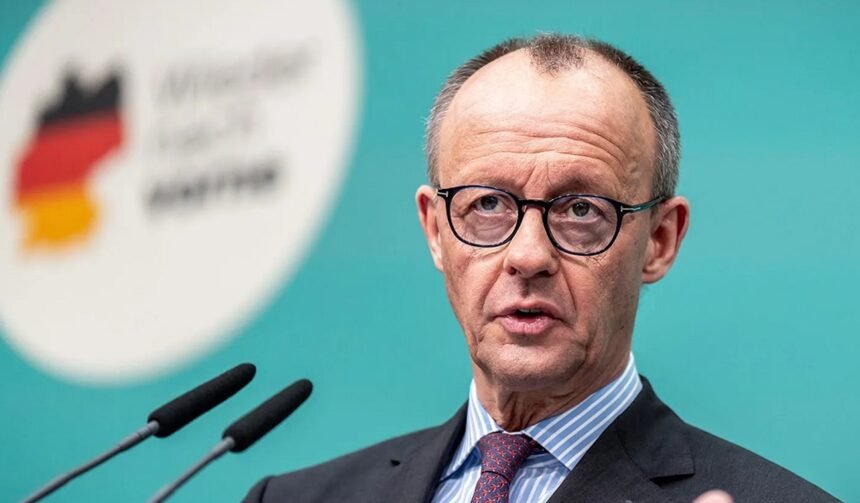The new German government, led by Friedrich Merz, must take a leading role in the European Union’s (EU) policy toward the Western Balkans and contribute to developing a strategic approach to the region, said Bodo Weber, senior associate at the Berlin-based Democratization Policy Council, in an interview with Radio Free Europe (RFE/RL).
Friedrich Merz, leader of the German Christian Democrats, was sworn in as Germany’s tenth chancellor on May 6, after securing the required majority in the second round of voting.
Regarding Germany’s approach to the Kosovo-Serbia dialogue on normalizing relations, Weber said that instead of fundamentally restarting the process, Berlin came forward with the Franco-German proposal, which he claims led to “a complete collapse of the political dialogue” and resulted in two agreements that “do not exist in reality.”
According to Weber, the new German government must make a “strategic turn” in its approach to Serbia and the policies of President Aleksandar Vučić’s regime to prevent the political dialogue from sinking entirely.
The agreement on the path to normalization of relations—accepted by Kosovo and Serbia in 2023—was initially known as the Franco-German plan and was backed by the EU and Western countries. An implementation annex was later agreed upon, but in practice, almost nothing has been implemented.
Weber told RFE/RL that it remains to be seen whether Germany has or is developing an appropriate foreign policy strategy but said it will certainly express concern over “third-party actors with harmful influence in the Balkans.”
RFE/RL: Mr. Weber, how would you describe Chancellor Merz’s foreign policy strategy? How does it differ from those of his predecessors, Olaf Scholz and Angela Merkel?
Bodo Weber: It’s still too early to judge. On his first day in office, with visits to Paris and Warsaw, and a joint visit to Kyiv with counterparts from France, the UK, and Poland, Chancellor Merz sent a strong signal that Germany intends to assume a leading role within the EU and globally. The new government’s policy was outlined during coalition talks, shaped by concerns about former U.S. President Donald Trump’s stance toward Ukraine and the EU, with a special focus on strengthening the EU’s common security policy—based on the belief that the U.S. has withdrawn from Europe as a values-based partner.
However, early moves—such as the visit to Ukraine and a joint EU-U.S. ceasefire initiative—accompanied by declarations that the U.S. remains the main partner, ended in failure, especially after Trump abandoned the initiative and surrendered to Vladimir Putin. We’ll see how things evolve.
Nonetheless, the new chancellor and his cabinet are emphasizing the need for a more decisive European and international policy. The question remains whether they will have the necessary strategy.
RFE/RL: What role should Germany play in EU policy toward the Western Balkans?
Weber: Germany should once again take a leadership role in EU policy toward the Western Balkans and help establish a strategic policy for the region—something the EU has lacked for over two decades. This includes the urgent need for a change in policy toward Serbia and a more political approach to the crisis in Bosnia.
RFE/RL: How do you see this government’s engagement with the Berlin Process?
Weber: Unlike when Scholz’s government came to power—when it was unclear whether the chancellor intended to continue the Berlin Process—this time the coalition agreement explicitly states its continuation. So Berlin remains committed to the process.
RFE/RL: How might Germany approach EU enlargement, considering the current political context in the EU and developments in the region?
Weber: Currently, that remains unclear—just like the entire Western Balkans policy. During its time in opposition, the CDU/CSU supported the concept of “staged membership,” which, in my opinion, is a failed idea and effectively a way to deny full membership by offering a second-class status. During coalition talks, the Social Democrats managed to neutralize this concept. However, the coalition agreement mentions the need for internal EU reform in order to admit new members—something that has long been discussed without success. Germany’s main issue is that for three decades, it has not contributed seriously to a strategic debate on the EU’s future—and consequently not to the future of enlargement either.
RFE/RL: What role could Germany play in the Kosovo-Serbia dialogue under Chancellor Merz’s leadership?
Weber: The new conservative government inherits the legacy of the political dialogue initiated by Chancellor Merkel, supported by conservative MPs. Under Scholz, rather than thoroughly resetting the dialogue after the dangerous episode involving a land-swap proposal, Germany launched the Franco-German initiative with insufficient political will—continuing a failed appeasement policy toward Vučić’s regime. The result was the collapse of the dialogue and two agreements that don’t truly exist.
The question now is whether the new German government will insist on these unfulfilled agreements or have the courage to push for a deep reset of the dialogue—toward a comprehensive and final agreement. This would require a strategic shift in the EU’s policy toward Serbia, treating Vučić’s regime not as a values-based partner. But that would also mean cutting ties between the CDU and its “sister party” SNS [Serbian Progressive Party]. It remains to be seen whether the CDU and Merz have the strength for that. If not, the dialogue will deepen into crisis, and the EU will further lose credibility as a democratic actor in both Kosovo and Serbia.
RFE/RL: Last year, Germany and France conditioned their support for Kosovo’s Council of Europe membership on the establishment of the Association of Serb-majority municipalities. Will Germany maintain this position?
Weber: Unlike Paris, Germany has been more lenient in conditioning Kosovo’s application to the Council of Europe. Whether Berlin will continue this policy on the Association—in the absence of a strategic framework—remains to be seen. It will depend on whether there is a strategic shift in policy toward the dialogue.
RFE/RL: How might bilateral German support for Kosovo evolve under this government—especially regarding political conditions or development aid?
Weber: I expect bilateral relations to remain stable. Thanks to the Social Democrats’ success in coalition talks—blocking the merger of the Development Ministry with the Foreign Ministry—the possibility of reducing development aid overall, including for the Western Balkans, has been automatically limited. This is an important signal, especially at a time when USAID has withdrawn and some EU countries have significantly reduced their aid.
RFE/RL: What stance might Germany take on the growing presence of external actors like Russia, China, or Turkey in the Western Balkans?
Weber: Germany, as before, will remain concerned about the actions of malign actors in the Balkans. However, it remains to be seen whether the U.S., under Trump’s administration, will join those actors in undermining the security interests and values of the EU in the region. Only through a decisive and strategic EU policy can these actors be successfully countered—and that requires serious leadership from Germany.







